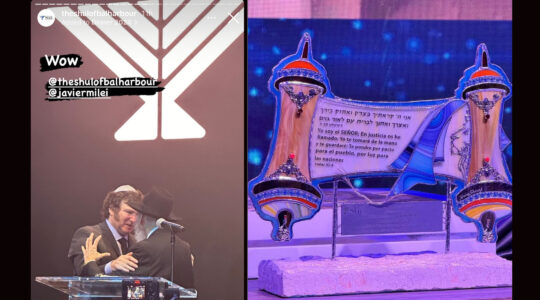Among my first stops in Europe this fall was Vienna to meet with Ed Serotta, the director of Centropa, which collects oral histories of pre-war European Jewish life. I rode with Serotta and a few dozen Holocaust survivors from Vienna to Linz for the opening of an exhibition of materials from the 15 countries in which Centropa operates.
Serotta has a piece in the Wall Street Journal today, the 65th anniversary of the liberation of Auschwitz, in which he writes of finding a book in a Jerusalem shop with an inscription — from a father to his son on the occasion of his bar-mitzvah — that raises more questions than it answers.
Did Papa go with him? There’s a good chance that he did not. Many parents stayed behind to watch after the family property, and to hold on to all they had built, hoping things wouldn’t get too much worse. There’s a good chance that Papa had served his country faithfully in World War I: 90,000 Jewish men donned the German army’s uniform between 1914 and 1918, and 10,000 fell fighting for their fatherland. Papa probably would have felt that no one would dare come after a German war veteran, a patriot such as he. He might have even felt that way until the knock came at the door.
All we know (or can surmise) is that Richard brought this memento of German Jewry — and of his father — with him to Palestine. But there is so much more we’d like to know. Was Richard married when, in 1948, the state of Israel came into being? Did he build a life in the new country that made him happy? Did he have children? Grandchildren? And were they the ones who brought the book to Stein’s?
Today marks the 65th anniversary of the liberation of Auschwitz-Birkenau, when Soviet troops entered this most infamous of the Nazi death camps to find only a few thousand emaciated survivors. More than 1.5 million Jews were murdered there. An additional 4 1/2 million met their end elsewhere by firing squad, in gas vans or in the other Nazi-built death camps.
For the past 10 years, the Jewish historical project I direct has been involved in an oral history project with Holocaust survivors. Unlike the many excellent projects that use video to record the horror stories of what people went through during the war, we have set ourselves a different task. We are interested in how people lived before and after the horrors.
Our subjects have allowed us to scan their old family pictures and documents, which they then go through with our researchers and talk about. So far, we have archived more than 22,000 snapshots, school report cards, wedding portraits and vacation pictures, and we’ve collected an array of stories to accompany them. We have memorabilia, but unlike with the book I found in Stein’s, we also have context, the complete stories of what a book or photograph or document meant to those who preserved it.





